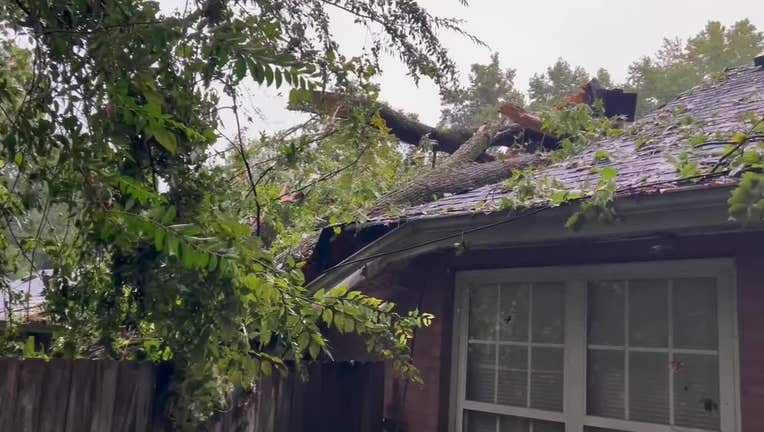What to do if your home was damaged by Hurricane Helene

File photo from previous storm
ATLANTA - President Joe Biden approved an emergency declaration for Georgia on Thursday, ahead of Hurricane Helene’s landfall.
This declaration allows federal assistance to support state and local efforts in responding to the hurricane. It gives the Department of Homeland Security and the Federal Emergency Management Agency (FEMA) authority to coordinate all disaster relief efforts.
Before filing a claim with FEMA, it's important to first contact your insurance company to find out what your policy covers. This should be done as soon as possible.
If you need to pay for emergency repairs or supplies to protect your property (like covering a hole in your roof with a tarp), make sure to document the costs and keep your receipts.
Avoid signing contracts with repair companies until your insurance provider has assessed the damage. Be cautious of fraudsters who may offer to fix damage but ask for payment upfront without intending to complete the work.
You can check a contractor’s license here.
Insurance companies are legally required to respond in a timely manner. If your insurance company is not responding quickly enough, you can report them to the Georgia Office of Insurance and Fire Safety Commissioner by calling 1-800-656-2298.
You can also file a complaint through the official portal: File a Consumer Insurance Complaint.
If you still need assistance paying for repairs after contacting your own insurance company, you may be able to receive assistance from the federal government.
To file a claim with FEMA (Federal Emergency Management Agency) if your home is damaged during Hurricane Helene, follow these steps:
1. Assess the Damage
- Before filing a claim, assess the damage to your home and document it with photos or videos. This will help when providing evidence of your loss.
2. Contact Your Insurance Company
- If you have homeowners or flood insurance, you should first contact your insurance company. FEMA may assist with expenses not covered by your insurance.
3. Apply for Assistance
You can apply for FEMA disaster assistance by using one of the following methods:
Online
- Visit www.disasterassistance.gov to fill out an application.
Phone
- Call FEMA's toll-free helpline at 1-800-621-FEMA (1-800-621-3362). For TTY, call 1-800-462-7585. These lines are available seven days a week.
In-Person at a Disaster Recovery Center (DRC)
- After a major disaster like a hurricane, FEMA often sets up Disaster Recovery Centers (DRCs) in the affected areas where you can apply in person. To find the nearest DRC, you can use the FEMA mobile app or visit the FEMA website.
4. Provide Necessary Information
When filing a claim, you'll need to provide:
- Social Security number
- Insurance information
- A description of the damage (include as much detail as possible)
- Address of the damaged property
- Current mailing address and phone number
- Annual household income
- Bank account information (for direct deposit)
5. FEMA Inspection
After you submit your claim, a FEMA inspector may schedule an appointment to assess the damage to your property.
6. Receive FEMA's Decision
FEMA will review your application and decide whether you qualify for assistance. If approved, FEMA may provide financial help for temporary housing, repairs, and other disaster-related expenses.
7. Appeal, If Necessary
If your claim is denied or you do not agree with FEMA's decision, you can file an appeal within 60 days.
Make sure to act as quickly as possible, as FEMA applications usually need to be filed within 60 days of the disaster being declared.
Here are the Georgia counties for which funding for disaster relief will be provided at 75% federal matching funds: Atkinson, Baker, Banks, Ben Hill, Berrien, Brooks, Calhoun, Cherokee, Clay, Clinch, Coffee, Colquitt, Cook, Crisp, Dawson, Decatur, Dooly, Dougherty, Early, Echols, Fannin, Forsyth, Franklin, Gilmer, Grady, Habersham, Hall, Irwin, Jackson, Lanier, Lee, Lowndes, Lumpkin, Macon, Miller, Mitchell, Pickens, Pulaski, Quitman, Rabun, Randolph, Schley, Seminole, Stephens, Stewart, Sumter, Terrell, Thomas, Tift, Towns, Turner, Union, Webster, White, Wilcox, and Worth.
Public assistance emergency protective measures, limited to direct Federal assistance and reimbursement for mass care including evacuation and shelter support, will be provided at 75% federal funding for the counties of Appling, Bacon, Baldwin, Barrow, Bartow, Bibb, Bleckley, Brantley, Burke, Butts, Camden, Carroll, Catoosa, Charlton, Chattahoochee, Chattooga, Clarke, Clayton, Cobb, Columbia, Coweta, Crawford, Dade, DeKalb, Dodge, Douglas, Elbert, Emanuel, Fayette, Floyd, Fulton, Glascock, Glynn, Gordon, Greene, Gwinnett, Hancock, Haralson, Harris, Hart, Heard, Henry, Houston, Jasper, Jeff Davis, Jefferson, Jenkins, Johnson, Jones, Lamar, Laurens, Lincoln, Madison, Marion, McDuffie, Meriwether, Monroe, Montgomery, Morgan, Murray, Muscogee, Newton, Oconee, Oglethorpe, Paulding, Peach, Pierce, Pike, Polk, Putnam, Richmond, Rockdale, Screven, Spalding, Talbot, Taliaferro, Taylor, Telfair, Toombs, Treutlen, Troup, Twiggs, Upson, Walker, Walton, Ware, Warren, Washington, Wayne, Wheeler, Whitfield, Wilkes, and Wilkinson.

